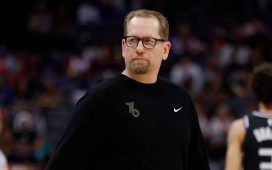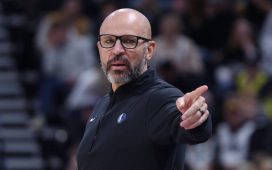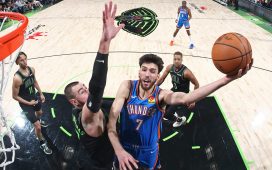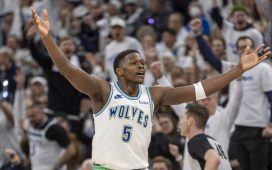EL SEGUNDO, Calif. — Filmmaker Antoine Fuqua’s connections to the Los Angeles Lakers are via his hometown of Pittsburgh. Norm Nixon played college basketball at Duquesne University before becoming a first-round pick of the Lakers in 1977, and Fuqua was a fan of his play at point guard.
But doesn’t every fan have a story of loyalty to a favorite team?
That doesn’t make Fuqua unique, but he was charged with directing a project on the Lakers and creating something unique, which isn’t easy given the proliferation of Laker-related content on and off the court just in 2022.
“The goal was to really keep the focus on the family,” Fuqua said.
That meant a heavy emphasis on the late Dr. Jerry Buss and his children in “Legacy: The True Story of the LA Lakers,” a 10-part docuseries that premieres Monday on Hulu.
Buss, who died in February 2013, earned the reputation as perhaps the best team owner in modern-day sports. Long before the likes of Mark Cuban were seen as blurring the line between ownership and players, Buss was befriending a young Magic Johnson, which did not go over well for some accustomed to a different player/team owner dynamic.
It’s a reputation his children have had to live up to in the nine years since his death. The Lakers won the 2020 NBA championship but have also missed the playoffs seven times in the last nine years.
Before the 2013-14 season, the Lakers had only missed the postseason five times since their start in Minneapolis in 1948.
The Lakers won a title in 1980, Buss’ first year of ownership, starting the “Showtime” era and the first of 10 championships in his lifetime and 11 overall for the Buss family. The tale of Buss and his six children is the most intriguing part of Lakers lore — not just Buss’ children, who all participated in the series, but also the family environment fostered between him and players over the years. There’s also the power dynamic between siblings and how that affects how the Lakers would be run.
Jim Buss had his turn being in charge, and the Lakers struggled. Jeanie Buss, now team president and controlling owner, became the first woman in the NBA to be the owner of a championship team in 2020. Who is in charge, how they became in charge and the stories of the siblings trying to figure out where they fit in sports — or if they even wanted to be in sports — are layers to the story told.
“Obviously, the family drama that happened in the process of success, that was important, as well,” Fuqua said. “But the most important thing to me was the family aspect of it. That’s the part I don’t believe I’ve ever seen from the mouths of the family.”
“Legacy” features the Buss children, which makes it different from Johnson’s documentary, “They Call Me Magic” from Apple TV+, or HBO’s dramatized “Winning Time,” which did not have the Lakers’ participation and raised well-chronicled disagreements from the people portrayed in the series.
“Everybody that we asked to participate agreed to be interviewed, and everybody gives the experience that they had because the fans know about what took place on the court,” Jeanie said. “But they don’t know what happened behind the scenes, and that’s what we wanted to show is what goes on after the game and the effect that winning has on people, on a family.”
Learning more about the family adds to what makes the Lakers one of the best dramas in sports. This installment in Laker content offering a look into how the Buss siblings tried to figure out where they fit in the hierarchy provides the franchise a chance to take control of the stories that have been out, whether via traditional media or films.
“This does feel like the Lakers trying to take ownership of their own Hollywood legacy,” Rotten Tomatoes contributing editor Mark Ellis said. “I think that’s why we keep coming back to the Lakers as great subject matter, because they are based in Hollywood and this is a town where we love telling stories that have flash, that have flair.”
Getting to the root of the Buss family story is central to the Hollywood story.
Dr. Buss was a chemist who found success in real estate before purchasing the Lakers. Several things worked in his favor for early success. The Lakers already had Kareem Abdul-Jabbar and fellow future Hall of Famer Jamaal Wilkes. There was Nixon, who would go on to become a two-time All-Star, and the Lakers won the coin flip that allowed them to draft Johnson.
But the Lakers weren’t the only talented team in the league. Buss brought pizzazz to the franchise and changed the way sports would be viewed by the public. He injected sizzle into a league in desperate need of something to capture the public’s attention.
“He was the first guy to integrate entertainment, sports, sex, bachelor owner,” Nixon said. “The first year, he bought the team with our style of play, and then we won the championship. So you’re in Los Angeles, all the biggest stars, everybody’s at the game.
“People watched the game on Sunday afternoon just to see who’s coming in on the red carpet. When you combine his philosophy with the Laker girls, and then we end up being a very good team with that style of play, I think that created the hype.”
Along with the hype, there was the family approach established. It’s something Fuqua looked to share with “Legacy.” The process showed Jeanie how deep that was when she heard the stories of players who had been traded but returned to the organization in some capacity.
“How the players became family, how did that relationship begin and how Dr. Buss, really on a handshake at times, made agreements with these guys and kept his word to them,” Fuqua said. “Players that got traded came back to work for the organization, things like that.”
Abdul-Jabbar played at UCLA but began his NBA career with Milwaukee. His admiration for how Dr. Buss treated him during his tenure remains.
“He always spoke of me with appreciation and paying me what I was worth,” Abdul-Jabbar said. “I always appreciated that.”
That’s why beyond the pressures LeBron James and Anthony Davis have to keep the Lakers contenders, there’s scrutiny and pressure on the Buss family, which makes their inclusion in the series most intriguing.
Dr. Buss was a millionaire who managed not to lose touch with his fan base. He had a keen sense for what Los Angeles fans needed. “Legacy” is a peek into how his children have navigated life chasing the standard their father set in making the Lakers a unifying force in southern California.
“Everybody talks about the seats on the floor and the celebrities and the high prices, but he always made sure he had seats that were the same as what it would cost to go see a movie so that families could come,” Jeanie said.” It was very inclusive; he wanted everyone to be a Laker fan, no matter where you came from.”
The Buss clan makes revisiting the Lakers again worthwhile.
“I think that’s a story that is worth telling time and time again,” Ellis said. “Even though, like a lot of folks, I’m getting sick of seeing that uniform.”
But the Lakers are Hollywood. So Ellis and the rest of us know this will not be the last time we see Laker uniforms featured in some form.
It’s just how Dr. Buss would have envisioned it.
(Photo of Jeanie Buss: Harry How / Getty Images)






